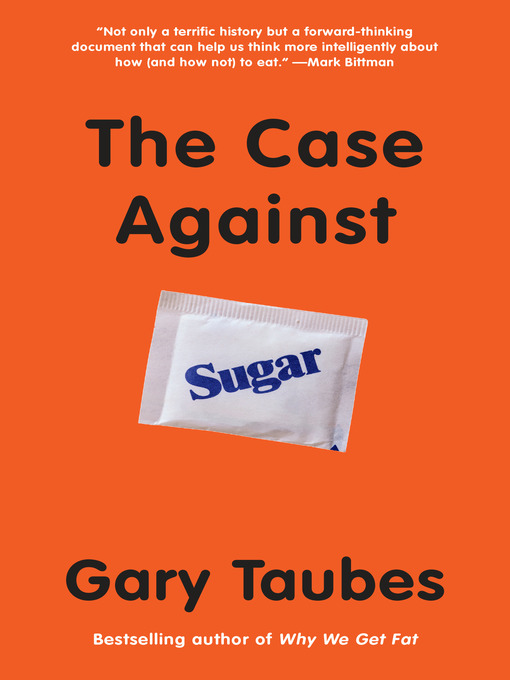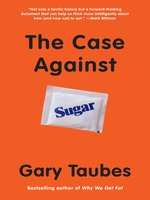-

September 19, 2016
The latest offering from health journalist Taubes (Why We Get Fat) prosecutes the case against sugar, in particular sucrose and high fructose corn syrup. His hypothesis is that “sugar is the dietary trigger of obesity and diabetes” and of related illnesses like heart disease. The author traces the history of sugar, delves into its biochemistry, explores false starts in the research into sugar’s health effects, and examines current developments in knowledge of chemistry and metabolism to bring home his point. Recognizing that condemning sugar is “the nutritional equivalent of stealing Christmas,” Taubes begins with an examination of whether sugar is addictive. (Short answer—yes, and it’s in cigarettes!) Fittingly, he ends with a discussion of how little is too much. (Short answer—probably very little.) Reiterating a point he makes throughout about the limits of research, the author concludes that “the evidence against sugar is not definitive, compelling though I may personally find it to be.” His study is itself compelling, as well as meticulously explained and researched. Readers will hate to love this book, since it will cause them to thoroughly rethink the place of sugar in their diets. Agent: Kris Dahl, ICM.
-

October 15, 2016
The award-winning journalist once again takes up the cudgel in defense of health.In his latest book, Taubes (Why We Get Fat and What to Do About It, 2010, etc.) makes the provocative contention that sugar, rather than fat, is the primary cause of obesity and a major culprit in a spectrum of chronic diseases. While it is now recognized that a drastic increase in the consumption of sugar and refined starches correlates to a dramatic rise of obesity in populations that adopt a Western diet, the author argues that nutritionists have yet to pinpoint its significance. He points out that obesity is a marker for the overconsumption of carbohydrates responsible for the onset of Type 2 diabetes. The problem, he writes, is not the number but the kind of calories consumed--nor is it necessarily a diet high in saturated fats. Taubes compares sucrose and high-fructose corn syrup to "toxins...that do their damage over years and decades, and perhaps even from generation to generation." Furthermore, diabetics and obese people are "more likely to have fatty liver disease" as well as other degenerative diseases due to elevated carbohydrate intake. For this reason, Taubes is dismissive of advice (from Michael Pollan, among others) that urges an across-the-board reduction in the total amount of calories we consume. The author buttresses his provocative contention with population studies showing the increase of chronic disease in populations that subsist on a Western diet. An example is the increase since 1960 of chronic disease among the indigenous population of a New Zealand protectorate that substituted a carbohydrate-rich diet for the saturated fats they formerly consumed. Taubes makes a convincing, well-documented case against the modern carbohydrate-rich diet. Limiting their intake is an important factor in longevity, not merely as a matter of weight control. An important book that merits--and will likely receive--broad circulation and discussion.
COPYRIGHT(2016) Kirkus Reviews, ALL RIGHTS RESERVED.
-

Starred review from October 1, 2016
Taubes takes the topic of his best-seller, Why We Get Fat and What to Do about It (2011), one step further in his latest. Beyond implicating carbohydrates as the enemy in modern diets, Taubes lays out, as his title suggests, the prosecution's argument if sugar alone were to be tried in criminal court, charged for causing the Western World's plagues of diabetes and obesity. Imagined concept aside, Taubes deals in science and fact, and what he relays is staggering. Namely, that the refutable calories in versus calories out theory of weight management has taken responsibility for illness away from sugar for more than a century; that the twentieth-century decision to blame fats and salt for heart disease is an overly assumptive and sadly immovable one; and that modern studies of the manifestation of diabetes and obesity in recently Westernized populations suggest that we're likely to be facing grave new problems moving forward if our sugar use isn't dramatically curbed. Acknowledging that responsible public-health policy and good nutrition science won't always overlap, as well as the difficulty in testing the effects of any single food in our diets, Taubes confidently recommends giving a severe reduction in sugar intake a try.HIGH-DEMAND BACKSTORY: Taubes' brilliant and accessible science writing has won him many fans, and, on a hot topic like this, demand will be huge.(Reprinted with permission of Booklist, copyright 2016, American Library Association.)
-

July 1, 2016
Okay, it tastes great, but sugar is making us very sick: diabetes and obesity are scarily rampant, and nearly ten percent of children are thought to have nonalcoholic fatty liver disease, all traceable to that sweet, sweet stuff. Award-winning science and health journalist Taubes tracks America's relationship with sugar, from its use as an additive (even in cigarettes) to the current overabundance of high-fructose corn syrup, and helps us understand how to make better decisions regarding sugar as individuals and as a nation.
Copyright 2016 Library Journal, LLC Used with permission.
-

October 15, 2016
Taubes (cofounder, Nutrition Science Initiative; Why We Get Fat) delivers another convincing book exploring the negative health issues surrounding sugar consumption. To create this fascinating and illuminating read, the author carefully juxtaposes historical events against the growth of the sugar industry and the limitations and misconceptions of nutritional and medical science. We learn how the sugar industry that supported research shaped the public's view of the ingredient's nutritional value and actively lobbied against any reports that held their product in a negative light. Taubes then turns the focus on how the growth of Western diseases parallels the adoption of sugar into the Western diet. Unfortunately, the author does not offer any plan of action, ending the final chapter with the statement that everyone must decide what is best for themselves. VERDICT This accessible book will be of particular interest to historians and health-conscious readers. Individuals seeking practical help in curtailing sugar in their diets would benefit from books such as Richard Jacoby's Sugar Crush. [See Prepub Alert, 6/13/16.]--Crystal Renfro, Kennesaw State Univ., Marietta, GA
Copyright 2016 Library Journal, LLC Used with permission.
-
Dan Barber, The New York Times
"Taubes's writing is both inflammatory and copiously researched. It is also well timed... Hard-charging (and I'll add game-changing)."
-
Eugenia Bone, The Wall Street Journal
"[A] blitz of a book... Mr. Taubes's argument is so persuasive that, after reading The Case Against Sugar, this functioning chocoholic cut out the Snacking Bark and stopped eating cakes and white bread... The Case Against Sugar should be a powerful weapon against future misinformation."
-
The Economist
"Compelling... Perhaps at long last, sugar is getting its just desserts."
-
The Atlantic
"Taubes builds his case through lawyerly layering of rich detail... Extraordinary and refreshing."
-
Outside
"[The Case Against Sugar] should be required reading if only to understand the scope, power, and impact that Big Sugar has had on America's health--or, perhaps more accurately, sickness."
-
Booklist, starred review
"Staggering... Taubes's brilliant and accessible science writing has won him many fans."
-
Library Journal
"[Taubes] delivers another convincing book... Fascinating and illuminating."
-
Publishers Weekly
"[Taubes's work is] compelling, as well as meticulously explained and researched. Readers will hate to love this book, since it will cause them to thoroughly rethink the place of sugar in their diets."








